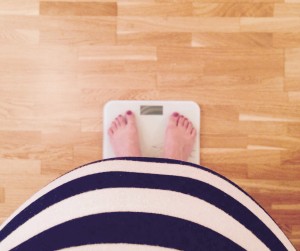By Iris Farrou
07 Feb, 2023
Health Conditions and Pregnancy, Lifestyle Tips, New Moms, Nutrition, Pregnancy, Queer Health, Women's Health
Healthy weight gain pregancy, How much weight should I gain in pregnancy, How to manage weight during pregnancy, Normal weight gain during pregnancy, Pregnancy diet, Pregnancy Nutrition
 If you are expecting, or are thinking of becoming pregnant, it is possible that you are also worried about your body weight. Many expecting mothers have faced this worry before, as pregnancy significantly alters your body and is expected (and should) increase your body weight. At the same time, you want to make sure that you experience a healthy pregnancy and don’t put yourself or your baby in danger. First of all, you should remember your baby weighs around 7-8 pounds– that’s a big chunk of pregnancy weight! Additionally, your placenta, a larger uterus, and amniotic fluid add about 2 pounds each. You will also experience an increased blood volume of 3-4 pounds, and increased fluid volume of 2-3 pounds, as well as larger breasts which add 1-3 pounds. It is important to remember that your fat stores, which are much needed for a healthy pregnancy and delivery, will add 6-8 pounds.
If you are expecting, or are thinking of becoming pregnant, it is possible that you are also worried about your body weight. Many expecting mothers have faced this worry before, as pregnancy significantly alters your body and is expected (and should) increase your body weight. At the same time, you want to make sure that you experience a healthy pregnancy and don’t put yourself or your baby in danger. First of all, you should remember your baby weighs around 7-8 pounds– that’s a big chunk of pregnancy weight! Additionally, your placenta, a larger uterus, and amniotic fluid add about 2 pounds each. You will also experience an increased blood volume of 3-4 pounds, and increased fluid volume of 2-3 pounds, as well as larger breasts which add 1-3 pounds. It is important to remember that your fat stores, which are much needed for a healthy pregnancy and delivery, will add 6-8 pounds.
Though these amounts may differ from person to person, the general weight added to a mother’s body by the end of pregnancy is about 30 pounds. Most expectant mothers gain 1-5 pounds in the first trimester and 1-2 pounds per week in the second and third trimester. According to the American Pregnancy Association, a pregnant woman of relatively normal weight who gets less than half an hour of exercise every week should have a calorie intake of 1,800 in the first trimester, 2,200 in the second trimester, and 2,400 in the third trimester. It is suggested that you limit processed foods, sugars, and extra fats when you are thinking about your diet while pregnant.
The first idea that pops into mind when thinking about a healthy diet during pregnancy is supplements and vitamins. Though these are definitely important, and prenatal vitamins ensure you don’t miss out on key nutrients, you do need to decide on the specifics by consulting with your doctor or healthcare provider. It is ideal to start taking a daily prenatal vitamin at least three months before conception. Discuss your options with your doctor before deciding, as supplements need to be tailored to add on to your current diet, any special diet, health conditions, and you need to know about possible supplements that do not have a good track record and may harm your pregnancy.
Other than supplements, the principle of any healthy diet applies to pregnancy as well– make sure you consume plenty of fruits, vegetables, whole grains, healthy fats, and lean protein. Here are the nutrients that deserve special attention during your pregnancy:
- Folate and Folic Acid: this helps decrease the risk of premature birth or low birth weight. It is also a B vitamin that helps the healthy development of the brain and spinal cord.
- Calcium: you may already know calcium is necessary for healthy bones and teeth, and both you and your baby need it. Did you know that calcium also helps the circulatory, muscular, and nervous systems?
- Vitamin D: this can work together with calcium to ensure healthy bones and teeth. Vitamin D is most commonly found in fatty fish, fortified milk, and orange juice.
- Protein: you want to keep on intaking protein throughout your pregnancy as it supports your baby’s overall growth and development. You need at least 71 grams a day.
- Iron: remember that during pregnancy you need double the amount of iron that non-pregnant persons need. The body uses iron to make hemoglobin, a protein in the red blood cells that carries oxygen to the body’s tissues. If you don’t get enough iron during your pregnancy, you may be at risk of developing anemia.
https://americanpregnancy.org/healthy-pregnancy/pregnancy-health-wellness/pregnancy-weight-gain/
https://www.mayoclinic.org/healthy-lifestyle/pregnancy-week-by-week/in-depth/pregnancy-nutrition/art-20045082
More
By Iris Farrou
07 Sep, 2022
Diet & Exercise, Health Conditions and Pregnancy, Heart health, Lifestyle Tips, Mental Health, Parenting, Postpartum, Pregnancy, Prevention, Queer Health, Reproductive health, Women's Health
Body Changes in Pregnancy, body positive, Body Positivity During Pregnancy, Body Positivity While Pregnant, Eating Disorders and Pregnancy, Healthy Lifestyle, Healthy weight gain pregancy, How much weight should I gain in pregnancy, How to manage weight during pregnancy, how to prepare body for pregnancy, Weight Gain Support
If you have armed yourself with all the knowledge you can gather regarding the possible changes
on your body during pregnancy, then you are one step closer to dealing with the physical effect
of those changes. Some women, though they do know their body will change during pregnancy
and possibly afterwards as well, do not seem to mind it at all. Great! According to a survey of
more than 1500 women, just over 41% said they felt more negative about their bodies after
pregnancy. Which goes to show: the majority of women are struggling with body image while
pregnant. Not to mention what the body image stress is probably not helping the baby…

Is this only related to pregnancy?
Of course not… women in general are held to unrealistic expectations of beauty standards—expectations that the media and society constantly repeat. In recent years, this pressure for body perfection has worsened with the rise of social media. What is worse in pregnancy, however, is that the changes are relatively rapid, weight gain is almost always expected, feelings are exacerbated, and you may even be feeling alien in your own body. A vessel, so to speak. All of these are true: you will most likely gain weight during your pregnancy, it’s possible to develop stretch marks, and it is also a possibility that your post-partum body will not be 100% the same as your pre-pregnancy body.
This is a lot…
Yes, this can absolutely be overwhelming. Despair not! Weight gain is—and we cannot stress this enough—normal, and healthy for your baby. Also, if your doctor or nurse gives you the green light, you can exercise while pregnant. It may be light exercise, such as swimming or walking, or pre-natal yoga. These options help make you more aware of the connection between your body and your mind, perhaps take some of the edge off and your mind off of your worries and are steps to ensure the overall health of your body.
If you are concerned about weight gain during pregnancy, make a plan with your doctor, nurse, or mid wife, about your diet. Allow yourself the small pleasures without guilt: your body is participating in the miracle of nourishing a new life. There is no way to make this happen in a healthy manner unless you experience changes yourself.
What else can I do?
Honestly, don’t bottle up your feelings. Being insecure about, or even disappointed with, your
body image is completely normal. Share those feelings and thoughts with your partner, talk about
those worries with your friends. You may want to join a mom group, or even an online
discussion forum where you can exchange ideas with others on the same boat. If it gets too
much, you can always talk to a medical professional or a therapist. Even if you didn’t have body
image issues before pregnancy, it is not uncommon that future mothers start facing those worries
for the first time when they become pregnant. You are not alone in this!
More
 “Well, I’m eating for two now, so I should really have just one more serving…” When you’re pregnant, the temptation to splurge on extra servings, or give-in to unusual cravings as your belly expands, can be easy. You’re gaining weight anyway. Who’s to say any one pound should be attributed to your meals and not to baby’s growing size?
“Well, I’m eating for two now, so I should really have just one more serving…” When you’re pregnant, the temptation to splurge on extra servings, or give-in to unusual cravings as your belly expands, can be easy. You’re gaining weight anyway. Who’s to say any one pound should be attributed to your meals and not to baby’s growing size?
The truth, however, is that regulated weight gain from high quality foods and a defined nutrition plan is critical to a healthy pregnancy, and a healthy newborn. Weight gained from sugary, fried, or processed foods, on the other hand, is not, regardless of how comforting they taste, or how easy it is to justify with the phrase, “But I’m eating for two.” Read on to learn how much weight you should gain during your pregnancy, and why it’s important to maintain a healthy weight strategy.
Healthy Weight, Healthy Baby, Healthy Mommy.
According to the Centers for Disease Control and Prevention (CDC), studies show that only 32 percent of women gain their recommended amount of weight during their pregnancy. Nearly half (48 percent) gain too much, and 21 percent don’t gain enough.
Women who do not gain enough weight during pregnancy are at risk of giving birth to an undersized infant. Babies born too small may experience such health complications as difficulty breastfeeding, developmental delays, or they may be at an increased risk of illness. Babies born to underweight women may even be born premature, which can lead to additional health complications. For moms, women who do not gain enough weight during pregnancy are at risk of anemia, or developing osteoporosis later in life.
Women who gain too much weight, also put both themselves and their babies at risk of health complications. Women who gain too much weight are at risk of delivering over-sized babies which may require a cesarean section, or escalate over time into childhood obesity. Babies born of overweight women are also at risk of being born premature.
Women who gain too much weight during pregnancy may face such health complications as gestational diabetes, or preeclampsia. They often also experience difficulty losing the extra weight. As a result, after baby is born they may experience their own health complications related to obesity, such as diabetes or high blood pressure.
How Much Weight Should You Gain During Your Pregnancy?
There is no fixed amount of weight that each woman should gain during her pregnancy. Rather, the amount is assessed based on your pre-pregnancy body mass index (BMI). Typically, women with an underweight BMI should gain 28 to 40 pounds during pregnancy. Women with a normal BMI should gain 25 – 35 pounds during pregnancy, women with an overweight BMI should gain 15 -25 pounds, and women whose BMI indicates they are obese should only gain 11 – 20 pounds.
How Many Extra Calories Do Pregnant Women Need.
The number of extra calories pregnant women need is less than you’d expect. You only need about 300 extra calories per day for the healthy development of your baby—an amount that is likely much less than that extra serving of ice cream, chips, or your other favorite comfort food.
Not only is the number of extra calories you consume important, so is the source of those calories. Your extra calories should come from lean proteins, fibers, grains, and healthy fats, not sugary carbohydrates or trans fats.
How to Develop a Healthy Weight Gain Plan.
Your OBGYN will work with you to put a healthy nutrition plan in place, based on your individual needs and health history. He or she will also weigh you at every visit to help track your progress and make adjustments to your nutrition strategy throughout your pregnancy if more weight needs to be gained or lost.
If you have questions about your weight or the health of your baby at any point throughout your pregnancy talk to your OBGYN. He or she will help you and your baby create and maintain a healthy plan from months one through nine. And if you are newly pregnant and live in the Western New York area, consider Chouchani, Sayegh and Robinson for all of your prenatal care. We are currently accepting new patients.
More
 If you are expecting, or are thinking of becoming pregnant, it is possible that you are also worried about your body weight. Many expecting mothers have faced this worry before, as pregnancy significantly alters your body and is expected (and should) increase your body weight. At the same time, you want to make sure that you experience a healthy pregnancy and don’t put yourself or your baby in danger. First of all, you should remember your baby weighs around 7-8 pounds– that’s a big chunk of pregnancy weight! Additionally, your placenta, a larger uterus, and amniotic fluid add about 2 pounds each. You will also experience an increased blood volume of 3-4 pounds, and increased fluid volume of 2-3 pounds, as well as larger breasts which add 1-3 pounds. It is important to remember that your fat stores, which are much needed for a healthy pregnancy and delivery, will add 6-8 pounds.
If you are expecting, or are thinking of becoming pregnant, it is possible that you are also worried about your body weight. Many expecting mothers have faced this worry before, as pregnancy significantly alters your body and is expected (and should) increase your body weight. At the same time, you want to make sure that you experience a healthy pregnancy and don’t put yourself or your baby in danger. First of all, you should remember your baby weighs around 7-8 pounds– that’s a big chunk of pregnancy weight! Additionally, your placenta, a larger uterus, and amniotic fluid add about 2 pounds each. You will also experience an increased blood volume of 3-4 pounds, and increased fluid volume of 2-3 pounds, as well as larger breasts which add 1-3 pounds. It is important to remember that your fat stores, which are much needed for a healthy pregnancy and delivery, will add 6-8 pounds. 

